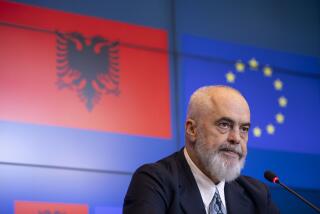European Union plans to cut migrant influx by working with largely lawless Libya
- Share via
Reporting from Valletta, Malta — European Union leaders at a summit Friday devised a plan involving largely lawless Libya to try to shut down the smuggling of hundreds of thousands of migrants from North Africa across the Mediterranean Sea to Europe.
The vast human tide has helped boost anti-EU populist parties across the continent that have exploited the immigration crisis to gain voters.
But even as EU officials meeting in the Mediterranean island nation of Malta were voicing hopes that the strategy would help stop the loss of thousands of lives yearly when flimsy trafficking boats from Libya founder or sink, concerns arose that the plan risks seeing thousands of people marooned in inhumane conditions in Libya.
Much of the plan’s success will depend on whether Libya can be helped by Europe to deter smugglers from operating along its poorly patrolled coastline. That’s a big unknown, given that the internationally backed Tripoli-based government only controls part of the sprawling country. Libya is beset by rival governments, militias and tribal factions that were unleashed in 2011 after the ouster and slaying of longtime ruler Moammar Kadafi.
“Naturally, we’re hoping for results,” Italian Prime Minister Paolo Gentiloni told reporters Friday. “There won’t be any miracles, but better management and reduction of illegal migrants are what we’re working toward.”
He said that if the plan can cut down on the hundreds of thousands setting off from Libya, it would also reduce the tragedies in which thousands of migrants die every year in the Mediterranean — including at least 5,083 last year.
In the last few years, Italy’s coast guard has coordinated the rescues of hundreds of thousands of asylum-seekers and other migrants who were then brought to safety on Italian shores. Most don’t want to stay in Italy but hope to reach families or find potential jobs in Germany or other wealthy northern European countries.
In March, the EU struck a deal with Turkey to stop the huge number of Syrians, Iraqis, Afghans and others heading from Turkish shores toward Greece and then overland toward northern Europe. That arrangement involved about $3.5 billion in EU funds for Turkey in exchange for that country keeping the migrants within its borders and caring for them.
“The Libyan government doesn’t have the same control as (Turkish President Recep Tayyip) Erdogan of his territory. We can’t expect the situation will change suddenly” in Libya, Gentiloni cautioned.
German Chancellor Angela Merkel conceded that Libya doesn’t have the needed stability to control all of its territory.
But citing an aid and cooperation deal that Italy signed Thursday with Libyan Prime Minister Fayez Serraj, Merkel said Europe would help by continuing to train the Libyan coast guard and would help Libya protect its southern border.
Migrant trafficking routes in North Africa pass through Niger and cross into Libya across the Sahara.
The European Union will also work to make sure there are better reception conditions for migrants. Voluntary returns will be stepped up, and the EU will get more involved with neighboring North African nations including Algeria, Tunisia and Egypt to contain the inflow of migrants. The EU will provide an additional $215 million for the plan.
But there are deep concerns that migrants could become trapped in horrific conditions in Libya if the trafficking route is cut off.
“The EU is yet again outsourcing its responsibility to protect the rights of migrants and refugees with no guarantees about what will happen” to them if they are stuck in Libya, said Ester Asin of the Save the Children charity.
Doctors Without Borders General Director Arjan Hehenkamp said the EU’s plan shows that it is “delusional about just how dangerous the situation in Libya really is.” The organization’s boats are involved in sea rescues, and Hehenkamp said the survivors have recounted starving in Libyan detention centers and other abuse while in the North African country.
U.N. High Commissioner for Human Rights Zeid Raad Hussein emphasized the importance of not sending people back to countries where they may face torture, persecution or other threats, calling it the “cornerstone of international human rights and refugee law.”
More to Read
Sign up for Essential California
The most important California stories and recommendations in your inbox every morning.
You may occasionally receive promotional content from the Los Angeles Times.










